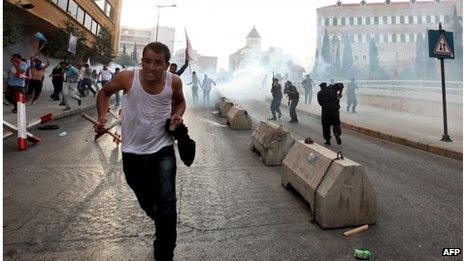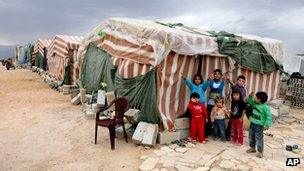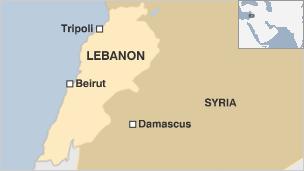Lebanon risks being torn apart by Syrian conflict
- Published

Unrest in Lebanon has increased fears that the Syrian conflict is crossing the border
Lebanon, like so many small nations buffeted by greater powers, has always sought and failed to carve out space for its own politics, free from the overweening influence of its self-appointed friends and protectors.
In this tradition, Lebanese Prime Minister Najib Mikati has over the past 18 months articulated a policy of "disassociation". As he puts it, "we decided to stay away from the Syrian crisis".
But things aren't so simple. As Leon Trotsky once noted: "You may not be interested in war, but war is interested in you."
Lebanon unavoidably sits in Syria's shadow. It is a rear area for the conflict.
More than 100,000 Syrians have already fled westwards, including 7,500 Palestinians who had been refugees in Syria. In northern Lebanon, the Free Syrian Army battling President Bashar al-Assad's regime enjoys cross-border tribal links, and finds respite, medicine and weaponry.
Lebanon is also a microcosm of broader sectarian and strategic rivalries. Sunni Saudi Arabia and Shia Iran jostle for influence, and pro- and anti-Assad factions often live adjacent to one another in combustible cities like Tripoli.
The 19 October assassination of Wissam al-Hassan, a top Lebanese intelligence official, is a continuation of this struggle: Mr Hassan was close to Sunni groups in Lebanon. He was seen as supportive of the anti-Assad rebels, and had previously played a role in uncovering alleged Syrian plots to conduct bombings across Lebanon.
The mounting anger of Lebanon's Sunni opposition echoes that of 2005. That year, a popular movement triggered by the suspected Syrian-sponsored assassination of former Lebanese Prime Minister Rafik Hariri forced Syria to withdraw its forces from Lebanon, ending 30 years of occupation.
But over the last few years, pro-Syrian forces have been on the ascendant. Hezbollah, the Shia militant group backed by Syria and Iran, and which is alleged to have contributed fighters to the Syrian regime's crackdown, outmuscled Sunni rivals on the streets of Beirut in 2008, and cemented its position in 2011 by stacking a new government with allies.

Tens of thousands of Syrians have fled to Lebanon to escape the violence
The group is now probably stronger than the Lebanese army itself - which, as if things weren't confusing enough, has received more than $720m (£450m) in American military aid since 2006. Under these circumstances, Lebanon cannot meaningfully "disassociate" itself from Syria.
Struggling army
The danger now is that Lebanon's state, always a tenuously negotiated compromise, falls apart under this strain.
Sunni factions want to bring down the government, something the United States has encouraged. But, since the killing of Rafik Hariri, these factions have lacked leadership.
As one Sunni resident of Beirut told the writer Mitchell Prothero in May, external: "The Shia have [Hezbollah leader] Nasrallah … we have a poster of a dead man."
Lebanon's security agencies are also divided. The Internal Security Forces, whose intelligence branch was led by the slain Mr Hassan, is perceived to be pro-Sunni and anti-Assad, whereas the General Security Directorate is close to Hezbollah.
In recent days, the Lebanese army has proven more assertive than in the past in keeping a lid on violence, but if skirmishes escalated to higher levels then it would struggle to stamp its authority.

In 2008, the army shrank from intervening in street battles, partly for fear that it would, as during the Lebanese civil war, fracture along sectarian lines.
Hezbollah is not eager to tear apart a state in which it holds such a strong position.
But, if violence once more becomes seen as the only way to redress grievances against the government, then the group, already anxious about losing its ally in Damascus, would not simply surrender - and the army might well have to choose between standing aside and falling apart.
Lebanese political leaders have called for calm, but the country's elite politics is at risk of becoming detached from the street.
This is particularly likely if such provocations as Mr Hassan's assassination recur or more Syrian plots in Lebanon come to light. Even if protests ebb away in the days ahead, Lebanon's fragile political system will remain dangerously vulnerable to Syrian spillover.
- Published24 October 2012
- Published22 September 2012
- Published19 October 2012
- Published27 September 2012
- Published22 October 2012